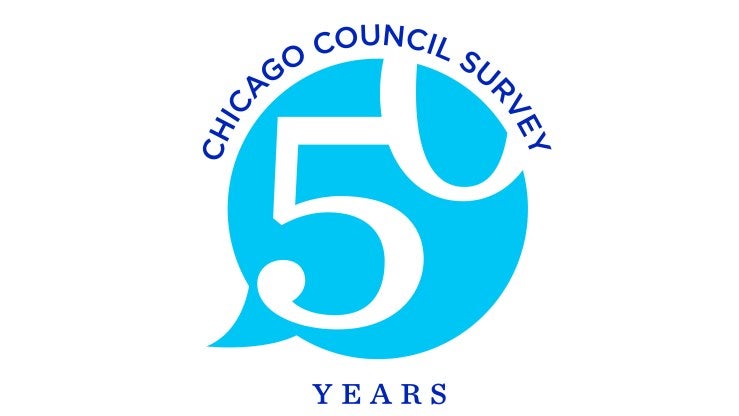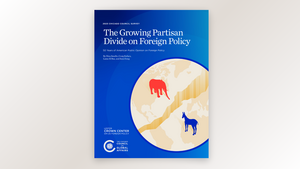Still, the US public prefers to maintain the status quo across the Taiwan Strait rather than risk military confrontation with Beijing.
Since the United States formally recognized the People’s Republic of China in 1979 and ended formal diplomatic relations with the Republic of China (the legal name for Taiwan’s government), Washington and Taipei have maintained a strong yet unofficial relationship. That relationship has been in the headlines over the past year as Taiwan—and its world-famous semiconductor industry—has taken on a growing importance in US foreign policy.
A series of surveys conducted this fall by the Chicago Council on Global Affairs, including the annual 2025 Chicago Council Survey, find that Americans view Taiwan warmly and tend to favor various approaches for supporting Taiwan’s international status. Concerned by the prospect of a military confrontation with China, the American public opposes sending US troops to defend Taiwan directly and prefers to maintain the status quo across the Taiwan Strait. Yet over the past year, Americans have also become more likely to favor aiding Taipei in the event of a crisis by providing other forms of aid—and more likely to favor using the US navy to break a blockade of the island.
Key Findings
- Half of Americans (50%) say the United States should encourage Taiwan to maintain the status quo, not moving toward independence (35%) or unification (6%).
- In the event of a crisis, Americans favor sending food and medical supplies to the island (77%), imposing economic and diplomatic sanctions on China (71%), and sending additional arms and military supplies to aid Taipei in its defense (63%).
- A larger percentage of Americans now support using the US Navy to break a Chinese blockade against the island: 47 percent favor doing so, up 10 points from 2024, while 47 percent oppose.
- While half of Americans (51%) oppose sending US troops to Taiwan to help it fight off a Chinese invasion, support for doing so has increased over the past year (43% now favor, up from 36% in 2024).
- Seven in 10 Americans (70%) say trade between the United States and Taiwan does more to strengthen US national security than it does to weaken it (24%).
Americans Across Party Lines View Taiwan Warmly
Overall, Americans give Taiwan an average rating of 57 on a zero to 100 scale, where zero represents a very unfavorable view and 100 represents a very favorable view. Views of Taiwan are positive across the political spectrum, though Democrats and Independents (an average of 59 each) rate Taiwan slightly higher than Republicans (an average of 54).
As a point of comparison, Americans view Taiwan as favorably as they view South Korea, with both receiving an average of 57, in between warmly viewed Japan (67) and more-neutrally viewed India (48). Taiwan has generally been viewed more favorably than mainland China in Council polling, all the more so since the early 2000s and especially since 2020, when American views of China sharply cooled.
US-Taiwan Trade Seen as Good for US National Security
One factor in those warm views is the extensive (and critical) US-Taiwan trade relationship. Seven in 10 Americans say trade between the United States and Taiwan does more to strengthen US national security (70%) than it does to weaken it (24%). Views are similar across partisan lines, though Democrats (74%) and Independents (71%) are more likely to view US-Taiwan trade as a net benefit to US national security than are Republicans (64%).
Overall Views on US-Taiwan Policy
Though Americans feel warmly toward Taiwan, it is not a top-of-mind issue for most. This means that when asked about specific potential? US policies to support Taiwan, many Americans—at least four in 10—say they don’t know enough to provide a response. Of those who do express an opinion one way or the other, Americans are much more likely to favor than oppose pro-Taiwan policies, in line with their positive views of Taiwan.
The most popular US policy toward the island is signing a free trade agreement with Taiwan (51% favor). Other policies, such as supporting Taiwan’s inclusion in international organizations, recognizing Taiwan’s independence, and committing to defend Taiwan from Chinese invasion, are supported by pluralities of Americans, though as many or more say they do not know enough to say one way or the other.
Support for signing a free trade agreement with Taiwan and committing to defend Taiwan from invasion have both declined somewhat over the past year, but outright opposition has not increased. Instead, more Americans now give a “not sure” response.
Americans Increasingly Favor US Response to Taiwan Invasion
In recent years, Beijing has steadily escalated pressure on Taipei though increasingly extensive military drills around the island. These exercises aim to convey Beijing’s objections to specific events (such as then-House Speaker Nancy Pelosi’s 2022 visit to Taiwan) and the general pro-sovereignty stance of Taiwan’s Democratic Progressive Party on cross-strait relations, in addition to preparing the People’s Liberation Army for potential conflict.
Should China launch an invasion of Taiwan, Americans favor providing support to Taiwan but oppose getting directly involved in the conflict. Majorities of Americans favor sending food and medical supplies to the island (77%), imposing economic and diplomatic sanctions on China (71%), and sending additional arms and military supplies to aid Taipei in its defense (63%). Support for aiding Taiwan in the event of a crisis through these means is bipartisan. Similar majorities across party lines favor providing food, medical supplies, and arms to Taiwan, while Republicans are more likely to favor imposing sanctions on China than Democrats or Independents.
Americans are more reluctant to commit US forces directly to a potential conflict with China, though support for doing so has risen over the past year. One potential scenario that worries many US policy planners is a blockade, in which the United States would be pushed to either make a first move against the Chinese military or accept Chinese control of the seas around Taiwan. Americans are evenly divided on whether to use the US Navy to break a Chinese blockade: 47 percent favor doing so, up 10 points from 2024, while 47 percent oppose. Support for antiblockade action by the United States has risen evenly across partisan lines. Currently, half of Republicans favor using the US Navy to break a blockade (51%, 44% oppose), while Democrats are more divided (46% favor, 50% oppose). Independents (44% favor, 50% oppose) tend to oppose breaking a blockade.
Finally, half of Americans (51%) oppose sending US troops to Taiwan itself to help it fight off a Chinese invasion. Yet support for this, too, has risen over the past year. Four in ten (43%) favor sending US troops to defend Taiwan directly, up seven percentage points from 2024. Support has risen across party lines, with Republicans (+6), Democrats (+9), and Independents (+8) all growing more supportive of the United States directly intervening in a cross-strait conflict.
Americans Favor Status Quo in Cross-Strait Relations
Though American support for aiding Taiwan in a crisis has risen, avoiding a conflict with China remains a key goal for Americans in US-China relations, and the American public is not looking to provoke a conflict in the Taiwan Strait.
Half of Americans (50%) say the United States should encourage Taiwan to maintain the status quo, not move toward independence or unification. One-third (35%) favor encouraging Taiwan to move closer to independence from China, even if this risks provoking a war with China. Finally, just 6 percent say the United States should encourage Taiwan to move closer to unification with China, even if this worsens US-Taiwan relations. On this question there are few differences across partisan lines, with Democrats slightly more likely than Republicans to favor maintaining the status quo over other policy options.
Conclusion
As US foreign policy has focused more on dealing with the challenges that the rise of China poses to US interests, America’s stance of “strategic ambiguity”—neither committing to nor ruling out US intervention in a cross-strait crisis—has come up for debate. For its part, the American public tends to prefer maintaining the status quo and is divided over whether to provide military support to Taiwan directly. Yet the public mood may also be shifting. Over the past year, Americans of all political stripes have become more likely to support aid to Taiwan in the event of a Chinese invasion.
This increase in American public support for Taiwan has come as Americans have begun shifting their view on US-China relations in favor of greater cooperation and engagement. Taiwan was surprisingly absent from readouts on the recent US-China talks between Presidents Donald Trump and Xi Jinping. But as Beijing and Washington resume more direct talks, it’s unlikely to be off the radar for long.
This analysis is primarily based on data from the 2025 Chicago Council Survey of the American public on foreign policy, a project of the Lester Crown Center on US Foreign Policy.
The 2025 Chicago Council Survey was conducted July 18–30, 2025, by Ipsos using its large-scale, nationwide, online research panel (KnowledgePanel) in English and Spanish among a weighted national sample of 2,148 adults 18 or older living in all 50 US states and the District of Columbia. The margin of sampling error for the full sample is ±2.2 percentage points, including a design effect of 1.07.
Partisan identification is based on how respondents answered a standard partisan self-identification question: “Generally speaking, do you think of yourself as a Republican, a Democrat, an Independent, or what?”
The 2025 Chicago Council Survey is made possible by the generous support of the Crown family and the Korea Foundation.
Additional results reported from August 2025 are from a Chicago Council on Global Affairs-Ipsos survey conducted August 22–24, 2025, by Ipsos using its large-scale, nationwide, online research panel (KnowledgePanel) among a weighted national sample of 1,021 adults 18 or older living in all 50 US states and the District of Columbia. The margin of sampling error for the full sample is ±3.1 percentage points, including a design effect of 1.05.
The data for the total sample were weighted to adjust for gender by age, race/ethnicity, education, Census region, metropolitan status, and household income using demographic benchmarks from the 2024 March Supplement of the Current Population Survey (CPS). The specific categories used were:
- Gender (Male, Female) by Age (18–29, 30–44, 45–59 and 60+)
- Race/Hispanic Ethnicity (White Non-Hispanic, Black Non-Hispanic, Other Non-Hispanic, Hispanic, 2+ Races Non-Hispanic)
- Education (Less than High School, High School, Some College, Bachelor or Higher)
- Census Region (Northeast, Midwest, South, West)
- Metropolitan Status (Metro, Non-Metro)
Household Income (Under $25,000, $25,000–$49,999, $50,000–$74,999, $75,000–$99,999, $100,000–$149,999, $150,000+)




Related Content
 US Foreign Policy
US Foreign Policy
While Republicans remain focused on limiting China's rise, a majority of Americans now favor a policy of cooperation and engagement with Beijing.
 US Foreign Policy
US Foreign Policy
Across party lines, however, opinion leaders oppose sending US troops to Taiwan to aid Taipei's defense should China invade.
 Public Opinion
Public Opinion
Unique parallel surveys find both publics agree trade and international engagement benefit their countries, but to different degrees.
 US Foreign Policy
US Foreign Policy
Results and analysis of the Council's 2025 annual survey of American views on foreign policy.
